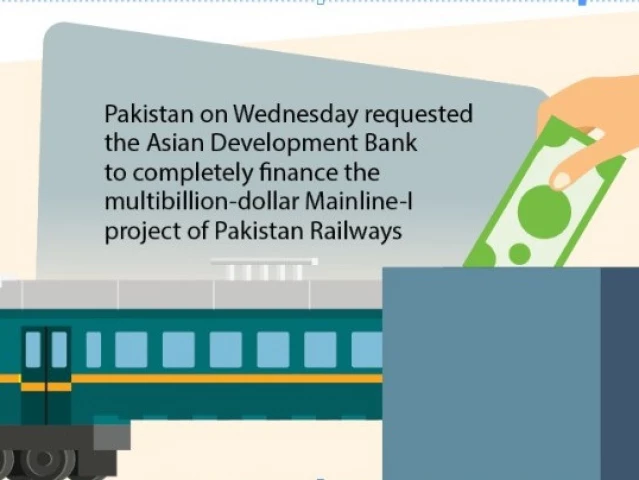ISLAMABAD:
Pakistan on Wednesday requested the Asian Development Bank (ADB) to fully finance the nearly $7 billion Mainline-I (ML-I) railways project in consortium with other multilateral lenders after failing to secure funding from China.
The country waited almost a decade for China’s 85% financing commitment for the project. The government has now returned to the ADB, which was keen to fund in 2016 but withdrew due to Beijing’s insistence on sole financing.
The Manila-based lender, along with the Asian Infrastructure Investment Bank (AIIB), has shown willingness to provide about 60% funding for the Karachi-Rohri section, said sources.
They added that the ADB may also consider financing other sections, but due to the project’s size, the lender may take a section-wise approach.
Pakistan raised the issue of complete financing from the ADB, AIIB, and other multilateral agencies during Prime Minister Shehbaz Sharif and Finance Minister Muhammad Aurangzeb’s meeting with ADB President Masato Kanda.
The early completion of the Karachi-Rohri section is critical for transporting copper and gold from the Reko Diq mines, said sources. The Reko Diq Mining Company plans to begin production by 2028, requiring a railway network for smooth and timely transportation.
The ADB has asked for detailed design documents of the Karachi-Rohri section to assess actual funding needs. It may partner with the AIIB to provide 60% of the funding, around $1.2 billion, for this section, they added.
The Planning Commission is expected to receive revised project cost documents this week to determine the true cost.
For mineral transportation, Pakistan needs rail links from Reko Diq to Gwadar and Reko Diq to Karachi, which require quality infrastructure at ML-I and ML-III. But the government has not found financing for ML-III, which will largely handle copper and gold transport and may not be commercially viable, said the sources.
The ADB has promised a $10 million Project Readiness Facility by November to validate the earlier Chinese feasibility study of ML-I, vet the project’s detailed design, and review the Rohri-Multan section. Based on its findings, the ADB is expected to approve multi-tranche loan facilities with AIIB and the European Investment Bank, sources added.
Government estimates put the Karachi-Rohri section at $2 billion and the Rohri-Multan section at $1.6 billion, bringing just these two to $3.6 billion. However, it is expected that due to international competitive bidding, the total cost will be still less than the projected cost under the bilateral framework.
The prime minister was keen to hold the groundbreaking ceremony of the ADB-funded ML-I in June next year, but the railways ministry and ADB gave December as the timeframe, said the sources.
The ADB president linked funding to the outcomes of the Project Readiness Facility report.
China had earlier asked Pakistan to reduce the ML-I cost from nearly $10 billion to $6.7 billion to make it financially viable. It was the only declared “strategically important” project under the China-Pakistan Economic Corridor (CPEC), and Islamabad demanded a concessional loan.
The project has faced over seven years of delay due to Pakistan’s high indebtedness. Pakistan had sought a loan equal to 85% of the cost from China, but Beijing refused concessional terms.
Prime Minister Shehbaz Sharif and President Xi Jinping had agreed a couple of years ago to advance the ML-I project in phases.
The original ML-I track was 1,872 kilometres long but was later reduced to cut costs.
Sources warned that even with ADB and other multilateral funding, arranging rupee cover from the finance ministry will be difficult due to the small size of the public sector development programme. The ministry must provide over Rs600 billion in rupee cover for just the Karachi-Rohri section in the next three years.
ADB’s president also met Finance Minister Aurangzeb, who requested an enhanced guarantee limit to issue Panda bonds. Initially planned at $250 million this year, the ministry is now considering raising $750 million to bridge funding gaps.
Aurangzeb said he would travel to China with the prime minister to discuss floating Panda bonds, requiring higher ADB guarantee limits.
A finance ministry handout said Aurangzeb highlighted Pakistan’s priorities for deeper collaboration with ADB in energy transition, climate resilience, transport, human capital, and resource mobilisation.
He expressed appreciation for ADB’s consistent partnership and reiterated Pakistan’s determination to build climate resilience and improve disaster preparedness after recent floods.
Aurangzeb also thanked ADB’s president for prioritising Pakistan as the first country he visited after assuming office, recalling earlier meetings in Washington in April.
The minister acknowledged ADB’s substantial support in recent years, citing reforms in resource mobilisation, women’s financial inclusion, disaster risk financing, and clean energy transition.
The ADB president appreciated Pakistan’s economic reforms and resilience, commending progress in stabilising the economy and advancing structural changes, the ministry said.
He assured continued ADB support in climate adaptation, population challenges, infrastructure, and resource mobilisation.
Kanda also pledged readiness to assist Pakistan in launching its first Panda Bond and other innovative financing tools.

